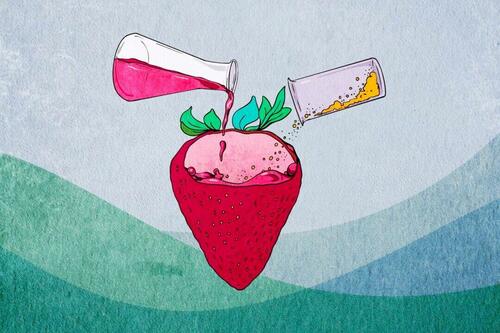
Authored by Matthew Little via The Epoch Times (emphasis ours),
Not long ago, people could only dream of the foods we have today. Tasty, cheap, and ready to eat. They last forever, look great, and come in endless varieties. Ultra-processed foods are a dream come true.

These new foods have achieved their incredible feats thanks to innovations in processing and a long list of additives that grant them superpowers denied to the foods eaten by previous generations.
Some of these additives do important work, like keep food bacteria-free or let it stay safe from spoiling without need for refrigeration. But others are “experiential” and do things like make the food bright red or give it a more satisfying texture.
Additives come in a variety of types. There are preservatives, flavorings, colors, stabilizers, emulsifiers, firming agents, humectants, and more. They have names like “titanium dioxide,” “sodium benzoate,” and “xanthan gum.” And the fact that people are living longer despite most Americans mostly eating ultra-processed foods would seem to indicate their safety.
Except that they are linked to many chronic diseases like cancer, and many other issues, including depression, and anxiety, and may contribute to cognitive decline. They may even be addictive.
Many additives have come under increasing scrutiny, with some states even banning some of them. And in some other countries, additives used in the United States have been banned for years.
While it’s easy to blame food makers for adding ingredients that may make us less healthy, the truth is that we buy what they sell, and ask for more—at the cheapest price possible.
My wife and I do stock some ready-to-eat foods though. Many grocery stores stock vacuum-sealed pouches of Indian food for $3, including rich dishes like baingan bharta, madras lentils, and palak paneer. The names may sound unfamiliar, but if you’ve ever eaten at an Indian restaurant, you know the food is well-flavored, typically a little expensive, and very satisfying.
And the thing that has always amazed me about the instant pouches is the stunning lack of weird ingredients. They are full of whole foods and spices with nothing that’s hard to pronounce. It makes me wonder what kind of foods the innovative companies in the United States could come up with if we really wanted them to.
America created ready-to-eat processed foods that have spread around the world, delivering exactly what we wanted in terms of price, flavor, and convenience. Now we just need to ask for foods with higher-quality ingredients and fewer additives that have uncertain effects on our brains and bodies.
Authored by Matthew Little via The Epoch Times (emphasis ours),
Not long ago, people could only dream of the foods we have today. Tasty, cheap, and ready to eat. They last forever, look great, and come in endless varieties. Ultra-processed foods are a dream come true.

These new foods have achieved their incredible feats thanks to innovations in processing and a long list of additives that grant them superpowers denied to the foods eaten by previous generations.
Some of these additives do important work, like keep food bacteria-free or let it stay safe from spoiling without need for refrigeration. But others are “experiential” and do things like make the food bright red or give it a more satisfying texture.
Additives come in a variety of types. There are preservatives, flavorings, colors, stabilizers, emulsifiers, firming agents, humectants, and more. They have names like “titanium dioxide,” “sodium benzoate,” and “xanthan gum.” And the fact that people are living longer despite most Americans mostly eating ultra-processed foods would seem to indicate their safety.
Except that they are linked to many chronic diseases like cancer, and many other issues, including depression, and anxiety, and may contribute to cognitive decline. They may even be addictive.
Many additives have come under increasing scrutiny, with some states even banning some of them. And in some other countries, additives used in the United States have been banned for years.
While it’s easy to blame food makers for adding ingredients that may make us less healthy, the truth is that we buy what they sell, and ask for more—at the cheapest price possible.
My wife and I do stock some ready-to-eat foods though. Many grocery stores stock vacuum-sealed pouches of Indian food for $3, including rich dishes like baingan bharta, madras lentils, and palak paneer. The names may sound unfamiliar, but if you’ve ever eaten at an Indian restaurant, you know the food is well-flavored, typically a little expensive, and very satisfying.
And the thing that has always amazed me about the instant pouches is the stunning lack of weird ingredients. They are full of whole foods and spices with nothing that’s hard to pronounce. It makes me wonder what kind of foods the innovative companies in the United States could come up with if we really wanted them to.
America created ready-to-eat processed foods that have spread around the world, delivering exactly what we wanted in terms of price, flavor, and convenience. Now we just need to ask for foods with higher-quality ingredients and fewer additives that have uncertain effects on our brains and bodies.
Loading…





